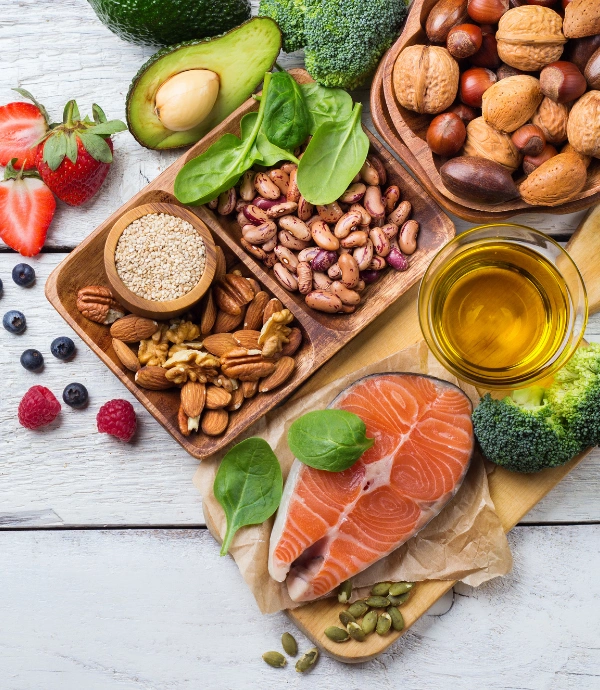Looking at What Foods to Eat To Stop Alcohol Cravings
In early recovery, many people find themselves questioning: when are my alcohol cravings going to let up?
Even once you’re sober, and the worst of your withdrawal symptoms have subsided, it’s likely you will find yourself craving alcohol. You may crave it for comfort or simply out of habit.
Cravings for alcohol cannot be avoided, but this doesn’t mean you’re powerless. Choosing the right foods and essential nutrients can reduce alcohol cravings.
This helpful guide from Ingrained Recovery goes over possible causes of your alcohol cravings, as well as eating foods that reduce alcohol cravings, that you should be incorporating into your diet.
Get Accredited Treatment Programs at Ingrained Recovery

What Causes Alcohol Cravings?
During active addiction, your brain looks to alcohol as a reward. Alcohol produces dopamine and serotonin: neurotransmitters that affect mood, pain, and pleasure. Your blood sugar may also play a role. Alcohol causes blood glucose to rise rapidly and then crash, leaving your brain craving something to “fix” it.
Many of the things you deal with during the recovery process can also make you crave alcohol. At one time, alcohol was a consistent, “normal” part of your life. Things like stress, lack of sleep, and dehydration can make you crave the sense of normalcy that you find in alcohol.
How Getting Certain Foods into Your Diet Benefits Addiction Recovery
Substance abuse has a way of making everything around you seem insignificant, especially proper nutrition and a healthy diet.
Damage to your stomach lining means that your body doesn’t absorb nutrients as well, and many of them are used as your body processes alcohol.
Following alcohol addiction (or even if you drink alcohol heavily for a long period) your body and brain need time to heal.
The foods that fuel you and give you energy also have nutrients that help the healing process. Certain foods can help repair gut health, organs, and brain function damaged during active addiction. Some also help stabilize blood sugar levels, enhance mood, and improve sleep.
Get Proven Detox and Rehab Options at Ingrained

Foods That Help Manage Alcohol Cravings
People in recovery are often surprised by how important something like nutrition is. Adding nutrient-dense foods helps you heal from damage that occurs through addiction. However, adding certain foods to your diet can also help you fight off cravings. Proper nutrition prevents blood sugar spikes, hunger, and other triggers that might make cravings for alcohol worse.
Keep in mind that eating better doesn’t mean that you have to cut out the foods you enjoy. Focus on whole, nutrient-dense foods when you can, but don’t be afraid to give in to your food cravings sometimes, too!
Healthy Fats to Support Brain Health
Over time, long-term alcohol consumption rewires your brain. This is why even once you’ve been sober for a few months (or longer), your brain might still crave alcohol. Adding healthy fats to your diet helps reverse some of those changes you experienced during alcohol addiction. Omega-3s are most beneficial for brain health and recovery, because they reduce inflammation and depressive symptoms that many people experience.
You’ll find healthy fats in olive oil, nuts, seeds, avocado, and fatty fish. Eating them can curb alcohol cravings, especially as you start to rewire your brain. Omega-3s also boost brain cell regeneration and improve how well neurotransmitters function. This is important for a better mood during recovery.
Complex Carbs to Prevent Blood Sugar Spikes
Many people in recovery crave sugar because when you drink, your body converts alcohol to sugar. It’s always a better choice to give in to sugary treats than alcohol cravings, but it can be triggering. Similar to alcohol, processed sugars boost energy and blood glucose levels, followed by a sudden crash.
Exercising in recovery can help normalize glucose levels and provide a healthier way of promoting dopamine than through substance use.
Choose complex carbohydrates when you can instead of processed grains and refined sugars. Foods like brown rice, whole grains like whole wheat bread and whole grain bread, oats, and sweet potatoes digest more slowly, support gut health, and won’t cause your blood sugar to rise so quickly.
Complex carbs also provide a slow and steady release of energy and contain fiber that promotes a healthy digestive system.
Fermented Foods for Better Gut Health
Damage from alcohol use disorder goes beyond your brain and liver. It also causes inflammation in your stomach lining that makes it harder for your body to absorb essential nutrients. The damage also harms gut health, something essential for mental health and brain function.
Without a healthy gut, your body doesn’t produce serotonin and other neurotransmitters as efficiently for a balanced brain chemistry. It’s harder to cope with stress and the ups and downs of mental health that are common during withdrawal and recovery. The best way to improve gut health is with probiotic foods, including sauerkraut, miso, kefir, yogurt, and kimchi.
Dark Chocolate for Sugar Cravings
Many people in recovery curb alcohol cravings with sugar because sugary foods make your dopamine levels spike, providing some of that same “high” you experienced while drinking. Dark chocolate is one of the foods that reduce alcohol cravings. It can help you satisfy those dopamine cravings without as much of a spike, especially if you choose chocolate with at least 70% cacao.
Eating dark chocolate also gives you a healthy boost of antioxidants like other beneficial foods can do. It has mood-boosting effects and can also give you a sense of comfort, something important for resisting alcohol cravings.
Leafy Greens and Other B-Vitamins

Many people in recovery are deficient in important nutrients, particularly B vitamins. Leafy greens, broccoli, fortified grains, and chickpeas contain folic acid, or B9. Half of your body’s folic acid is stored in the liver, so alcoholism severely depletes your stores.
Thiamine, or Vitamin B1, is another common deficiency. B1 is water soluble and the small amount that is stored by the body is found in the liver. Thiamine can be found in whole grains, fish, and meats.
Lean Proteins for Better Recovery in Alcohol Detox
Protein contains amino acids like tyrosine and tryptophan that are converted into serotonin and dopamine. They also make your neurotransmitters work better and help your brain start returning to its “normal” state after alcohol addiction.
Adding lean proteins like chicken, turkey, eggs, legumes, and tofu is also satiating. These forms of protein rich foods decrease alcohol cravings by preventing hunger and stabilizing blood sugar levels. They are also ideal when consuming foods needed for sustained energy and athletic performance.
Spicy Foods That Reduce Alcohol Cravings
Spicy foods like hot sauce, peppers, and curries get their heat from an ingredient called capsaicin. Capsaicin boosts the happy hormone and reduces stress, giving you some relief when you are experiencing alcohol cravings.
Spicy foods can also be used as part of a mindfulness exercise if you are having obsessions about the desire to consume alcohol.
These are the best foods to use during detox and early recovery as a sensory distraction when you’re craving alcohol, like chewing a piece of mint gum, holding a piece of ice, or smelling a lavender candle.
Foods When You’re Experiencing Withdrawal Symptoms

Withdrawal is physically and mentally exhausting. Your body needs nutrition to support detox, but alcohol withdrawal symptoms like nausea, vomiting, and anxiety make it hard to eat. The best approach is to stay hydrated and reintroduce foods into your diet slowly.
Rice, broths, toast, or bananas are easy on the stomach, making them a good place to start. Try coconut water or sports drinks for better hydration. As nausea starts to fade, start adding fruits and vegetables, high-protein foods, and complex carbohydrates to replace essential nutrients and build back liver health and your overall health on a holistic level.
Other Strategies to Help Cravings
Resisting increased alcohol cravings in recovery goes beyond nutrition. Things like staying hydrated, sleeping well, sticking to your treatment plan, and having support all play important roles in helping you curb cravings and stay sober.
Hydration and Proper Rest
Nutrition can help reduce alcohol cravings, but it isn’t the only way to take care of your body. Dehydration feels like hunger or stress, which might make cravings worse. Sleeping enough also helps you manage alcohol cravings.
When you’re well-rested, you’re able to think things through and act rationally, instead of out of emotion. Using rational thought is important when resisting the temptation of alcohol and to overcome addiction in general.
Following Your Treatment Plan

Avoiding alcohol consumption is the goal, but your treatment plan is how you are going to get there. Keep appointments with mental health professionals and attend regular meetings that are convenient for your schedule.
Structure your day in a way that keeps you busy, but isn’t too stressful. Prioritize sleeping well and self-care. Lastly, find coping skills and support that you can lean on during times when it isn’t as easy to resist alcohol cravings.
Leaning on Support Systems
Alcohol misuse can be isolating, especially if you’ve distanced yourself from loved ones or made poor decisions while drinking. Recovery should be much different. Friends, family members, sponsors, therapists, and support groups are all people you can lean on while in recovery. They are your network.
With a “network”, you aren’t putting all the responsibility on one person to support you. Keep communication open, talk when you need to, and spend time with the people who motivate you to stay sober.
Up To 100% of Rehab Costs Covered By Insurance
Find a Holistic, Healing Approach at Ingrained Recovery
Recovery is about reclaiming your life: one meal, one decision, and one day at a time. Eating the right foods can reduce alcohol cravings, improve gut health, and help you think clearly for the first time in a long time.
Ingrained Recovery in Eastman, GA prioritizes nutrition as one of the building blocks for a better, sober life. We teach our clients to eat well and reduce alcohol cravings, as well as coping strategies for those times when cravings are severe. We want to help you take the next steps in recovery. Call us to learn more today.
